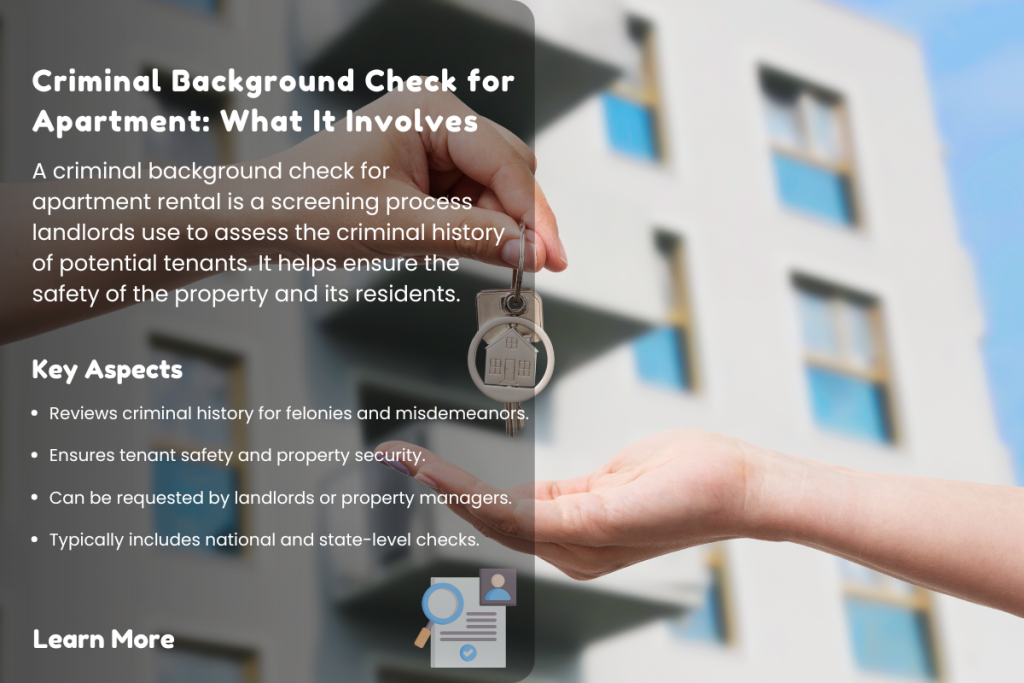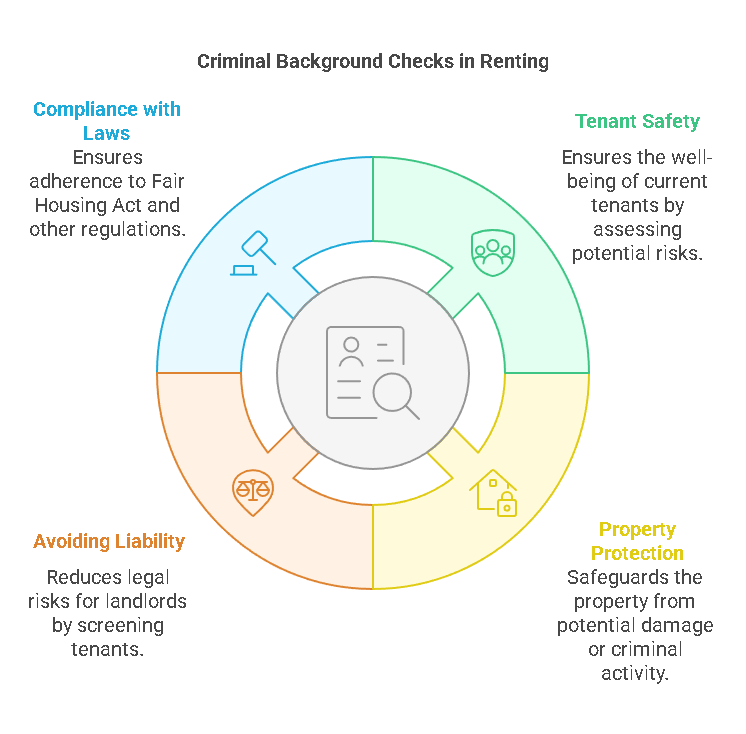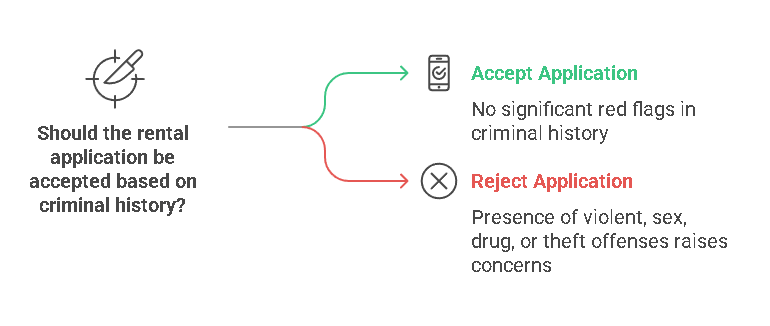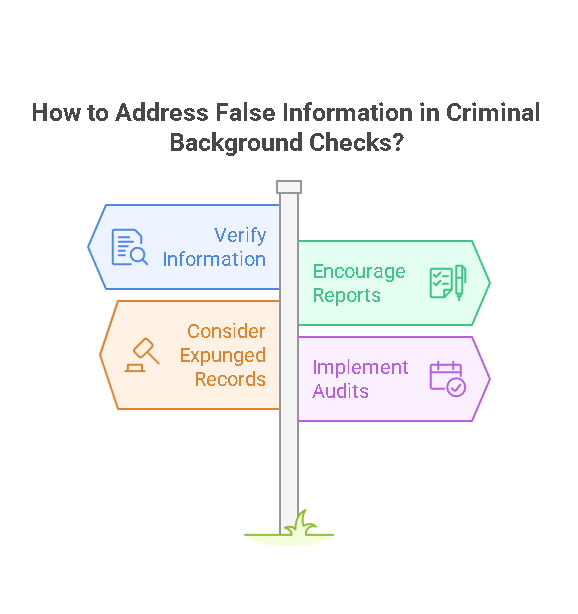Criminal Background Checks in Apartment Rentals: Legal Insights and Tenant Protections

What Shows Up on a Criminal Background Check for Apartment
A criminal background check is a standard procedure in the apartment rental process, where landlords assess the criminal history of potential tenants. This check helps landlords evaluate whether applicants pose a risk to the safety and security of their property and other tenants. The background check usually includes an analysis of any criminal records, which may influence the landlord’s decision on whether to approve or deny the rental application.
Understanding what shows up on a criminal background check for an apartment is crucial for both landlords and prospective tenants. Landlords use this check to make informed decisions about their applicants, while tenants should be aware of the implications of their criminal history on their rental prospects.
Importance of Criminal Background Checks for Apartments

Criminal background checks serve as a crucial tool for landlords during the tenant screening process. These checks provide landlords with an accurate history of an applicant’s criminal behavior, which helps them make safer decisions for their properties. Here are the primary reasons why these checks are conducted:
- Tenant Safety: Ensuring the safety of existing tenants is a top priority for landlords. A background check allows them to assess whether an applicant poses a risk of criminal behavior, particularly violent crimes, that could threaten the well-being of others.
- Property Protection: Criminal records related to property crimes, such as burglary, theft, or vandalism, can give landlords insight into the applicant’s potential behavior and how it may impact the property.
- Avoiding Liability: Landlords may face legal consequences if they rent to tenants with a history of criminal behavior that endangers other tenants. A criminal background check helps mitigate this risk.
- Compliance with Fair Housing Laws: Landlords need to ensure they are complying with all applicable laws, including the Fair Housing Act, while conducting background checks and making rental decisions.
What Information Shows Up on a Criminal Background Check for an Apartment?
A criminal background check for an apartment typically reveals various types of criminal records, which can include:
1. Criminal History
Criminal history refers to any past criminal offenses that the applicant has been involved in. These offenses can range from minor infractions to serious felonies. The specific crimes that may show up on a criminal background check include:
- Felonies: Serious crimes, such as murder, assault, robbery, or drug trafficking, typically remain on a criminal record for an extended period.
- Misdemeanors: Less serious offenses, such as petty theft or simple assault, may show up, but their impact on the rental decision is often less significant than that of felonies.
- Arrests without Convictions: In some jurisdictions, arrests that did not lead to a conviction may still appear on a background check, depending on local laws. However, many landlords focus more on convictions than arrests without follow-up legal outcomes.
2. Convictions
Convictions refer to criminal offenses for which the applicant was found guilty in court. These are the most important pieces of information landlords are likely to consider. Depending on the severity of the conviction and the applicant’s behavior since the conviction, landlords may be more or less inclined to rent to the individual.
- Serious Convictions: Convictions related to violent crimes, sex offenses, or drug-related charges may significantly impact the approval of an application.
- Minor Convictions: Convictions for minor offenses such as public intoxication or disorderly conduct might not have the same weight in a landlord’s decision-making process, but they may still be relevant.
3. Sex Offender Status
Sex offender status is a critical aspect of criminal background checks, as landlords may be legally obligated to ensure they are not renting to someone listed on the sex offender registry. In many states, including Texas, landlords are required to run checks to see if an applicant is a registered sex offender.
- Sex Offender Registry: If an applicant appears on the registry, it could result in the immediate denial of their rental application.
- State-Specific Regulations: The requirements for checking the sex offender registry may vary by state or local laws, but landlords often conduct this check as part of the criminal background screening process.
4. Other Criminal Records
Other criminal records that may appear on an apartment rental background check include:
- Outstanding Warrants: If the applicant has any active warrants for arrest, this will show up during the background check. Such information could raise red flags for landlords.
- Pending Charges: Charges that have been filed but not yet adjudicated can also be included, although this is less common. Pending charges may affect a landlord’s decision depending on the nature of the charge.
Types of Criminal Background Checks
There are different types of criminal background checks that landlords can use to assess an applicant’s criminal history:
1. National Criminal Background Check
A national criminal background check is a comprehensive search across the entire United States. It includes a review of criminal records maintained by various states and federal agencies. This type of check is useful for uncovering criminal histories that span multiple states and provides a broader perspective on the applicant’s criminal background.
2. State and Local Checks
State and local checks focus on criminal records within a specific state or local jurisdiction. These checks may not cover offenses committed outside the state, so landlords may need to run both state and national checks to get a complete picture of an applicant’s criminal history.
- State-Specific Databases: Many states have their own databases of criminal records, which landlords may check as part of the rental process.
- Local Criminal Records: In some cases, landlords may also conduct checks with local police departments or courthouses to find out if an applicant has any criminal records at the city or county level.
Red Flags for Landlords

Certain criminal records may raise red flags for landlords. Common offenses that could lead to the rejection of a rental application include:
- Violent Crimes: Felonies such as assault, murder, and robbery pose a significant safety risk for other tenants.
- Sex Offenses: Applicants on the sex offender registry may be rejected based on legal requirements or tenant safety concerns.
- Drug Offenses: Criminal records related to illegal drug use or trafficking could lead to rejection, particularly if the landlord believes it could affect the property’s safety or atmosphere.
- Theft and Property Crimes: Felonies involving theft, vandalism, or burglary may be a cause for concern, as landlords want to avoid tenants who may damage the property or steal.
How Long Does a Criminal Background Check Take?
The duration of a criminal background check depends on various factors, including the type of check being conducted and the responsiveness of the relevant authorities. Typically, a criminal background check for an apartment can take anywhere from a few days to a couple of weeks. Here are the main factors influencing the time it takes:
- Third-Party Services: If a landlord uses a third-party screening service, the process may be quicker than conducting a background check directly through government databases.
- State or Local Processing Time: Some states or local jurisdictions may take longer to provide criminal records, especially if the background check requires manual searching.
- Applicant’s Criminal History: If an applicant has a complex criminal history or has lived in multiple jurisdictions, the background check may take longer to complete.
What Shows Up on a Criminal Background Check for Apartment
Addressing and Preventing False Information
The Challenge of False Information in Criminal Background Checks
While criminal background checks are an essential part of the apartment rental process, false or outdated information can sometimes cause problems for both landlords and tenants. False data on a criminal background check can lead to an unfair denial of a rental application, causing inconvenience and distress to potential tenants. For landlords, false information can result in the wrong decision about an applicant, potentially renting to someone who poses a risk or denying an individual who would otherwise be a responsible tenant.
Common Sources of False Information
There are several reasons why false information may appear in a criminal background check:
1. Name and Identity Confusion
In some cases, criminal records may be mistakenly attributed to an individual due to shared names, addresses, or other personal information. For instance, if an applicant shares a name with someone who has a criminal history, there may be confusion, leading to inaccurate results.
2. Errors in Data Entry
Criminal record databases are not always perfect. Mistakes during the entry of data into government or commercial databases can lead to the appearance of incorrect charges, dates, or other details in background checks.
3. Outdated Records
Criminal background checks may reveal outdated records that have not been updated to reflect cleared charges, pardons, or expungements. If a criminal record was sealed or dismissed, it may still show up unless the record is properly updated in the database.
4. Inconsistent Reporting Between Jurisdictions
Different jurisdictions may report criminal records with varying levels of accuracy, leading to discrepancies in the information. For example, a felony conviction in one state might be reported differently in another jurisdiction, complicating the screening process for landlords.
How to Address False Information in Criminal Background Checks

To prevent false information from affecting the rental process, both landlords and tenants should be proactive. Here are some ways to address and resolve inaccuracies:
1. Verify Information with Multiple Sources
Landlords should cross-check background information with multiple databases or official sources. Relying on a single report could lead to discrepancies that cause problems. By verifying information across various sources—such as local police departments, courts, and national databases—landlords can reduce the risk of relying on false information.
2. Encourage Tenants to Provide a Background Check Report
Tenants can request a background check report from trusted services before applying for apartments. This gives them the chance to review the results in advance and dispute any inaccuracies before the landlord sees the report. Many online background check services also allow individuals to obtain a free or low-cost copy of their report.
3. Consider Expunged and Sealed Records
In many jurisdictions, tenants may have had certain offenses expunged or sealed. Landlords should be aware that sealed or expunged records should not be included in a background check or considered in the rental decision. Tenants who have had records expunged should be encouraged to provide legal documentation to confirm that these records are no longer part of their criminal history.
4. Implement Regular Data Audits
For landlords using third-party screening services, it’s essential to ensure that the data used for background checks is up to date. Regular audits of the data sources can help catch errors and ensure the accuracy of criminal history information. Working with reliable screening services reduces the risk of inaccuracies and helps create a smoother tenant approval process.
5. Provide an Appeal Process
Landlords should establish a clear and fair process for tenants to challenge discrepancies in their criminal background check results. This might include giving applicants the opportunity to provide additional documentation, such as court records or legal proof of a cleared charge. A transparent appeal process can help protect both landlords and tenants from the negative impacts of false information.
Role of PreciseHire in Managing False Information
PreciseHire offers comprehensive background check services for landlords and property managers, helping ensure that the tenant screening process is accurate and efficient. Their services include:
- Accurate Screening Reports: PreciseHire uses up-to-date and reliable sources to ensure the information in background checks is accurate. By partnering with trusted data providers, PreciseHire reduces the risk of false information.
- Data Verification Services: PreciseHire can assist landlords in verifying criminal records with multiple sources, ensuring that they are not basing rental decisions on incomplete or incorrect data.
- Expungement Assistance: If an applicant has had a criminal record expunged, PreciseHire helps ensure that this information is properly accounted for in the background check report, preventing outdated or irrelevant data from being included in the screening process.
- Discrepancy Resolution: PreciseHire also provides a service for resolving discrepancies in criminal background reports, helping landlords and tenants navigate the appeal process with ease.
Through these services, PreciseHire helps landlords avoid the risks associated with false information and ensures a fair and transparent rental process for all parties involved.
Preventing False Information: A Data-Driven Approach
To illustrate how false information can impact background checks and how different jurisdictions handle criminal records, the table below shows a comparison of various types of criminal offenses across multiple states.
| Offense Type | State A | State B | State C | Notes |
|---|---|---|---|---|
| Felony Conviction | 7 years | 10 years | Lifetime | Felonies may appear for varying durations based on jurisdiction |
| Misdemeanor | 5 years | 7 years | 3 years | Some states limit the period for which misdemeanors show up |
| Drug Offenses | 5 years | 7 years | Lifetime | Some states allow drug offense expungement after a certain period |
| Sex Offender | Lifetime | Lifetime | Lifetime | Sex offender status is often lifetime, regardless of expungement |
| Arrests Without Conviction | 2 years | 5 years | 1 year | Arrest records may show up depending on local regulations |
This table highlights how the length of time that criminal records stay on a background check varies by state, which can cause inconsistencies if the information is not updated or reviewed carefully. It also emphasizes the importance of verifying criminal records across multiple jurisdictions to ensure accuracy.
The Role of Accurate Criminal Background Checks in Preventing Discrimination
Ensuring accurate criminal background checks is essential to avoid discrimination in the rental process. While landlords have a responsibility to protect their property and tenants, they must also comply with Fair Housing Laws. Inaccurate or outdated criminal background information could unintentionally lead to discrimination against certain applicants, which is unlawful.
By relying on trustworthy services like PreciseHire, landlords can ensure they are conducting background checks that are both thorough and fair, minimizing the risk of rejecting tenants based on inaccurate or irrelevant information.
Legal Aspects of Criminal Background Checks
When it comes to criminal background checks for apartment rentals, there are several legal considerations that landlords must be aware of to ensure compliance with federal, state, and local regulations. These laws are designed to protect tenants’ rights while allowing landlords to maintain safety and security for their properties.
Fair Housing Act and Criminal Background Checks
The Fair Housing Act (FHA) prohibits discrimination in housing based on race, color, religion, sex, familial status, national origin, or disability. While criminal background checks are generally legal and commonly used by landlords, it’s important that the screening process does not inadvertently violate these anti-discrimination provisions.
In recent years, the U.S. Department of Housing and Urban Development (HUD) has issued guidance on how the FHA applies to criminal background checks. It specifically addresses the concern of using criminal history as a screening tool in a way that disproportionately impacts certain racial or ethnic groups. If a landlord’s use of criminal history disproportionately excludes applicants based on race or national origin, they may be violating the Fair Housing Act.
To ensure compliance with these laws:
- Adopt Clear and Consistent Screening Policies: Landlords should establish clear policies on how criminal history is used to evaluate rental applications. These policies should be applied uniformly to all applicants to avoid discriminatory practices.
- Consider the Nature and Relevance of the Offense: The use of criminal history should be relevant to the applicant’s ability to be a responsible tenant. Landlords are encouraged to consider the type of offense, the severity, the amount of time that has passed, and whether the offense is directly related to the applicant’s ability to rent and live in the apartment.
- Avoid Blanket Bans: Some jurisdictions have passed laws that prohibit landlords from automatically rejecting applicants with criminal records. Instead, landlords may be required to assess each case individually, taking into account the circumstances of the offense, the applicant’s rehabilitation, and the length of time since the offense occurred.
State-Specific Laws on Criminal Background Checks
In addition to federal regulations, many states have specific laws that govern the use of criminal background checks in the rental process. These laws vary widely by state, so landlords should be familiar with their local regulations.
For example:
- Ban the Box Laws: Some states and cities have “ban the box” laws that prohibit landlords from asking about an applicant’s criminal history on the initial rental application. This ensures that tenants are not unfairly screened out based on their criminal past before they have an opportunity to present their case.
- Expungement and Sealing of Records: Many states allow individuals to expunge or seal certain criminal records after a specified period, particularly for nonviolent offenses. Landlords should ensure that they are not considering expunged or sealed records when conducting background checks.
- Local Ordinances: Local jurisdictions may have additional rules or limitations regarding how landlords can use criminal history in tenant screenings. For instance, some cities may have laws that limit how far back a landlord can look into a tenant’s criminal history.
Tenant Protection and Rights
Tenants also have rights when it comes to criminal background checks:
- Right to Know: Tenants have the right to know if criminal background information is being used in their application process. If a landlord decides not to rent to an applicant based on criminal history, the tenant should be informed and provided with a copy of the background check report.
- Right to Dispute False Information: If a tenant believes that the information on their criminal background check is inaccurate or outdated, they have the right to dispute the information. This can be done through the screening service or by contacting the relevant law enforcement agency to correct or update the record.
Frequently Asked Questions (FAQs)
Can a Landlord Deny an Applicant Based on Criminal History?
Yes, landlords can deny an applicant based on their criminal history, but it must be done in a way that is fair and non-discriminatory. A landlord cannot reject applicants based on their race, color, national origin, or other protected characteristics under the Fair Housing Act. The criminal history must also be relevant to the rental property and the applicant's ability to be a responsible tenant.
How Long Does a Criminal Background Check Stay on Record?
The duration that a criminal record stays on an applicant’s record depends on the type of offense, the state laws, and whether the record has been expunged or sealed. Felony convictions may stay on a record permanently unless expunged, while misdemeanors may be removed after a specified number of years in some states.
What Should I Do if My Background Check Contains False Information?
If false information is found on your criminal background check, you can dispute it. Contact the background check provider and provide documentation that proves the information is incorrect, such as court records or proof of expungement. If the issue is not resolved by the provider, you can reach out to the relevant government agency to have the information corrected.
Do Landlords Have to Consider Expunged or Sealed Records?
No, landlords are generally not allowed to consider expunged or sealed records when making rental decisions. If an applicant has had their criminal record expunged or sealed, they should provide proof to the landlord to ensure that the record does not impact their application.
Can I Be Denied a Lease for an Arrest Record?
Arrest records alone do not provide sufficient grounds for a landlord to deny a lease. While a conviction may be considered, an arrest record without a conviction is typically not a valid reason for denying an applicant. Landlords should focus on convictions rather than arrests when evaluating criminal history.
Conclusion
Criminal background checks are an essential part of the tenant screening process, helping landlords maintain a safe and secure environment. However, false information in these checks can have serious consequences for both tenants and landlords. By understanding the common sources of inaccuracies, adopting fair screening practices, and complying with relevant laws, landlords can reduce the risk of errors and ensure that their rental decisions are based on accurate information.
For landlords seeking reliable and accurate background check services, PreciseHire offers comprehensive solutions that help ensure tenants are screened fairly and in compliance with all legal requirements. Whether you’re concerned about outdated information, expunged records, or discrimination issues, PreciseHire can guide you through the process, providing the tools and support needed to make informed and legal decisions.
By staying informed and proactive, both landlords and tenants can work together to create a rental environment that is fair, transparent, and legally sound.
